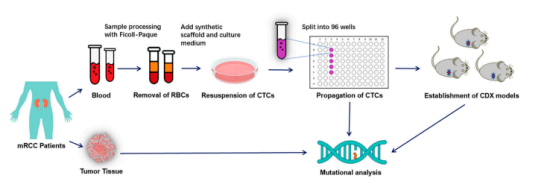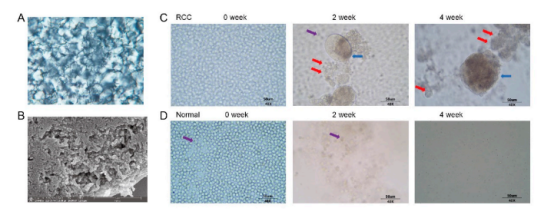Delve into the recent findings that shed light on the genetic mutations propelling renal cell carcinoma metastasis. This breakthrough research identifies key genetic factors that may pave the way for more precise and effective treatments for kidney cancer patients.
A recent study published in Diagnostics provides groundbreaking insights into the genetic mutations that may drive renal cancer cell metastasis and implantation. The research team, led by Baoan Hong and Ning Zhang, explored the potential driver gene mutations based on circulating tumor cells (CTCs) culture, a critical condition for the invasion and distant metastasis of renal cell carcinoma (RCC).
The Study’s Approach
The researchers included 15 patients with primary metastatic renal cell carcinoma (mRCC) and three healthy subjects. They obtained peripheral blood and cultured CTCs using synthetic biological scaffolds. Successfully cultured CTCs were used to construct CTCs-derived xenograft (CDX) models. The team then performed DNA extraction, whole exome sequencing (WES), and bioinformatics analysis to identify potential driver gene mutations.

Key Findings
The study successfully cultured peripheral blood CTCs and constructed CDX models. Bioinformatics analysis revealed that KAZN and POU6F2 genes may be closely related to RCC prognosis. The comparison between CTCs and primary tumor tissues showed significant differences in mutated genes, indicating the unique genetic landscape of CTCs in RCC metastasis.

Clinical Implications
The identification of KAZN and POU6F2 as potential driver mutations provides a foundation for developing targeted therapies for RCC. High expressions of these genes were associated with a significantly worse overall survival rate, highlighting their potential as prognostic markers.
Limitations and Future Directions
While the study offers valuable insights, the authors acknowledge the limited patient cohort and the need for further validation. Future research will focus on understanding the mechanisms by which these genes contribute to RCC malignancy and metastasis.
Conclusion
This pioneering research opens new avenues for understanding the genetic underpinnings of RCC metastasis. By identifying key genetic drivers, the study paves the way for more personalized and effective treatment strategies for patients with renal cell carcinoma.
Read the full study to delve deeper into the genetic landscape of renal cancer and the potential therapeutic implications of this research.
https://doi.org/10.3390/diagnostics13111855

